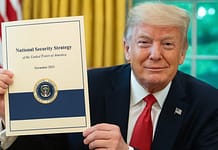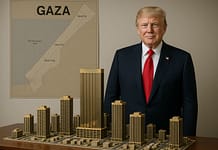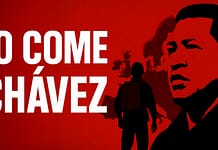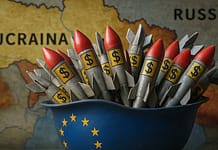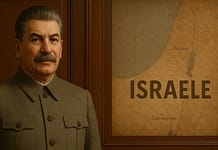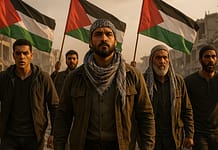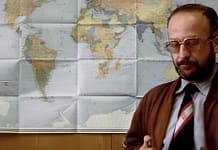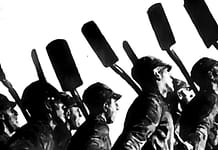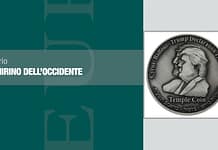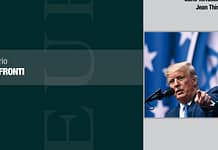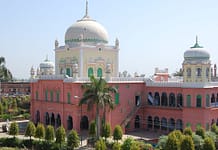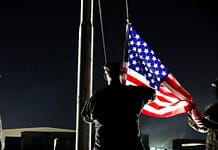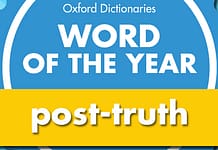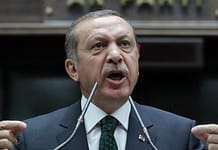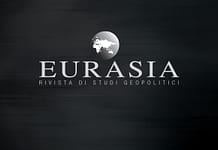 CHANGING EQUATIONS AND GEOMETRY OF REGIONAL AND GLOBAL POWER
CHANGING EQUATIONS AND GEOMETRY OF REGIONAL AND GLOBAL POWER
Daniele Perra
I would like to analyze the figure of Gen. Soleimani on two different levels: an ideological level and a geostrategic one, providing at the same time a geopolitical frame of the last years. In this regard, it is very important to underline the fact that, from an American (or Zionist) perspective, Gen. Soleimani represented a threat on both levels; in this occasion I will try explain why. It is also important to understand that the assassination of Gen. Soleimani and the recent killing of the scientist Mohsen Fakhrizadeh are strictly linked. This is pretty obvious.
So, let us start from the geostrategic level. Already in 2018, the US Secretary of State Mike Pompeo, during a diplomatic mission in the United Arab Emirates, stated: “Qassem Soleimani is causing trouble in Iraq and Syria and we need to raise the cost for his organization and him personally”[1].
Always in 2018, the Prime Minister of the Zionist entity Benjamin Netanyahu invited the so called “international community” to keep in mind the name of Mohsen Fakhrizadeh, considered by him and Mossad as the director of Iran’s secret nuclear weapons project[2].
This means mainly two things: 1) they were both in the killing list of the American-Zionist services for a long time; 2) the killing operations took at least two years to be carried out.
Furthermore, there is also another fact that I would like to underline. I do not believe in coincidences. Few hours before the tragic explosion in Beirut’s port, even if Israel has denied any responsibility for what actually happened, Netanyahu was threatening Hezbollah on Twitter social platform. And that specific area of the Lebanese city was considered since July 2020 as a strategic target by the Israeli Defense Force[3].
Therefore, what we are facing here is a precise and aggressive strategy of killings, destabilization and sabotage (including cyberattacks) that, in my opinion, goes far beyond the Zionist fear of the Iranian nuclear bomb and it does not apply exclusively to Iran (or broader Middle East) but to the whole Eurasian Continent. This is the reason why I personally defined Gen. Soleimani, in an article published few days after his brutal and sneak assassination, as a martyr of Eurasia: a martyr for the battle to end the American hegemony in the whole Eurasian region.
In fact, the three events mentioned before (the killings of Soleimani and Fakhrizadeh and the explosion in Beirut) are connected each other, but, at the same time, they are connected even with other geopolitical processes ongoing in Eurasia: the destabilization of Caucasus, the sabotage of the New Silk Road Initiative in many areas of interest (Kyrgyzstan, Kashmir and Thailand for instance), the pressure at the borders of China.
Just to be clear, at the moment, there are no signs that this strategy will end with the new American administration. In fact, this strategy started already under Obama administration. Trump just pushed it to its extremes.
From 2014, Barack Obama recognized the matter of fact that, in a moment of economic and power decline, it was time for the US to end the period of their direct military interventions because of their high costs. But the former US President, of course, did not mean an end of the American interventionism. Just, in Obama’s strategy, this “interventionism”, in case of non-direct threat to America, would have been entrusted to regional allies, proxies and contractors[4].
In this sense, Donald Trump just followed the steps of his predecessor. The clearest demonstration of that is the unconditional support granted to terroristic groups such as the “Iranian People’s Mojahedin” (which probably played a role, with Mossad, in the killing of Fakhrizadeh)[5] or the anti-Chinese Islamic Movement of Turkestan (recently removed by US from the list of the terrorist organizations).
Regarding Donald Trump, there is another important aspect. During the four years of the Trump administration, many times the President of Syria Bashar al-Assad and the Supreme Leader Ali Khamenei have affirmed that his presidency has showed the real aggressive face of America. If this is true for Syria, Palestine, Iran or Venezuela, we cannot say the same thing for the “West”. In fact, in the geographic space subjected to the American cultural hegemony was quite spread the myth of the “pacifism” of a presumed “anti-systemic” US president. The whole West, and even some unsuspected geopolitical theorists, have been kept under this sort of spell which made them believe that the Trump administration would have posed the word “end” to the time of American interventionism all over the world, going back to a certain “isolationism”. So, for four years we have witnessed a continuous attempt by certain media (even alternative ones) to depict Donald Trump as a “pacifist” in struggle with the American deep State. “He did not declare any new war”, they used to say. Now we know that there was nothing farther from reality than that.
First of all, trade wars are considered wars in every aspect. And, in the case, of Iran (or China and Russia) a war is already ongoing even if not openly declared and with asymmetric character. Second, the so called “isolationism”, as the German scholar Carl Schmitt pointed out, has been the first real expression of the American imperialism. Third, the ideological system behind the rise of “trumpism” was still strongly influenced by the theory of the clash of civilizations. Fourth, we cannot forget the huge help that the Zionist American lobby gave to Donald Trump for his electoral campaign[6].
Personally, I believe that what we call “trumpism” has just represented the most aggressive and decadent phase of the American imperialism. Trump’s presidency, accelerating some geopolitical processes already ongoing before 2016, has just marked the road for the implementation of the strategy that the US needed to save their hegemonic global status. For instance, I am pretty sure that there will be no space for a return to the JCPOA. The terms of this agreement, in fact, were not being respected by the American part already during the Obama administration. And, in my opinion, even through the JCPOA (aimed to freeze temporarily the conflict in Middle East in order for the US to focus on the Far East threat: that is China), the final target for Washington was a penetration in Iran that could have progressively led to operations of “regime change” from inside. This is the reason why I believe that ayatollah Khamenei is perfectly right when he says that is time to neutralize the sanctions more than loosen them. In this regard, the strategic partnership with China and Russia is fundamental (but also with Pakistan and Turkey)[7]. And it is fundamental to strengthen Iran’s military capabilities and its strategic deterrence[8].
Now, it is time to come back to Gen. Soleimani. He played a major role in countering the American strategy for the Middle East that we have mentioned before. He actually contributed with his organizational skills in the development of the Iranian unconventional military capability which allowed Tehran to act as a regional power even if under a regime of sanctions and embargos. Thanks to Gen. Soleimani and the Quds Force, which have defeated the Zionists proxies in Syria and Iraq, Iran has been able to spread its geopolitical influence towards the region. In other words, Soleimani’s contribution has been fundamental for restoring Tehran as a geopolitical “pole”. What does it mean? Each geopolitical “pole” needs two specific traits (or characteristics) to perform its role: a spiritual orientation that attracts people around it and the military capability to project influence and guarantee security. Before Soleimani, Iran used to have only the first characteristic: a traditional spiritual orientation (not an artificial one like the “Judeo-Christian West”)[9]. Now it has gotten both the traits mentioned before. This is the reason why he has been killed and why, even before his death, Ali Khamenei used to call him a “living martyr of the Revolution”.
The killing of Soleimani, which was trying to build a Middle East free from US hegemony through pacific cooperation among its States, has opened the doors to the sign of the so called “Abraham Agreement”: a fake peace deal sponsored by Washington and aimed on building a block of contraposition not only against Tehran (or simply to guarantee customers to the American military industry), but also against any possibility of cooperation among the Mediterranean area, Europe, and that part of Eurasia which remains out from American geopolitical control. In few words, with this strategic scheme, America aims to keep its hegemony not only on the Middle Eastern region but also on Europe: the “pearl” of their untraditional “empire”, still condemned to a total lack of sovereignty[10].
Considering the “ideological level”, Soleimani was a threat to the “West” because, as a Muslim, he defeated the Islamic State: a pure creation of western intelligence services useful, not only for the operations of destabilization, but also to carry on the rhetoric of the clash of civilizations which, in the last 20 years, has shaped the ideological life of the part of the world subjected to the US hegemony. In other words, the work of Martyr Soleimani has dismantled the ideological superstructure built by some American theorists to guarantee and justify the US role of global policeman in the unipolar moment. Pasdaran, Hezbollah and People Mobilization Units, for instance, have defended the Christian communities in Syria and Iraq from the violence perpetrated by the terrorist groups armed by the “West”[11].
Overcoming the western clash of civilizations with Islam, Soleimani has opened new possibilities for the multipolar evolution of the world order. He can be the “civilizing hero” of our desperate times. His exemplary life goes far beyond the borders of Iran and Islam itself.
Using the words of Imam Khomeyni, we can say that he was a real man and, mainly for this reason, he has been killed. Because the enemies of humanity always fear the real men[12].
The point now is to understand if Iran will have the strength to keep alive his heritage. I personally believe so, but, since I do not see the possibility of a new deal with the “West” in the near future, I think it is crucial to improve the cooperation with the multipolar forces of Eurasia.
 THE GEOPOLITICS OF IRAN AFTER THE ASSASSINATION OF GEN. SOLEIMANI
THE GEOPOLITICS OF IRAN AFTER THE ASSASSINATION OF GEN. SOLEIMANI
Amedeo Maddaluno
- To use a geographic criterium, we can distinguish among “close” and “far” dangers encircling the Islamic Republic.
- The main problem Iran must be afraid of are the close ones. The main real “far problem” is represented by the United States. In Teheran many think that the new President will be more open to establish a dialogue with Iran, and they also think that that will be good. To be crystal clear, this will be the case: Biden will possibly more dovish toward the Islamic Republic and gaining an easing – if not a lifting – of the sanctions will be important for Persian economy. Possibly: President Biden is not necessarily an enemy of the interventionist democrats. The issue is in the long run: a deposition of the US goal of submitting Iran is not foreseeable, and, in the long run, the US showed to be no reliable partner-in-deal. They signed treaties they denounced when administration changes. They militarily aggressed countries – think Libya – they had previously welcomed in the global order they created. So the Islamic Republic must understand that has no real leverage to influence the US policy in a more benevolent and durable way: as we say in Italy, “You can choose a wolf as a friend, but then you must keep a dog with you”. The only option the Islamic Republic has is a solid and reliable system of alliance and partnership: the end of the “No West, no East, Islamic Republic!” policy can be unpleasant but necessary.
- Which alliances? Russia is in a decline which is both economic and military, struggling to keep its influence over the former soviet states alive. This can create opportunities for Iran to offer Russia an opportunity to divert US interest from its very near abroad: in many theaters Russian and Irani interest can coincide, take Syria and Venezuela: they both need to contain and possibly roll-back US expansionism, pragmatically “clustering” their relations about different topics – Russian and Irani policy toward Israel are definitely different if not opposite. Another real friend for Iran can be found in China: not only must the People Republic “contain and reverse” US policies, but it also shares the same problems of the Islamic Republic with Europe. The European Union has repeatedly showed and made clear it has no independent policy. If Europe must temporarily face and anti-EU administration in Washington, it simply stand-by waiting for a new pro-EU administration and acts reactively. If a pro-EU administration makes its way to the Withe House, Europe starts acting proactively, but always toward the US, not the toward the World. As the Irani-policy of the EU was parallel or reactive to the US one and never proactive or independent, so will be the China-policy of the Union.
- If, toward far problems, Iran has no leverage, toward the close ones, namely Israel, Turkey, and the Arab word, it has little more. The Arab-Sunni world is building stronger and stronger relationship with Israel, and this relationship is nothing but an anti-Persian alliance. Turkey policy has its anti-Persian standing of its-own and Iran could hardly exploit the distance between Ankara, Tel Aviv and Riyadh or Abu Dhabi. Turkey is re-building its Ottoman space, so far with US silent approval and Zionist silent cooperation. The Turkish agenda, apart from propaganda, is no pan-Islamic or “eurasianist” agenda but a pan-Turkish and nationalistic one. US – and Israel – know that it can be exploited for anti-Russian, anti-Chinese and anti-Irani purposes: the Turkish space can separate these three worlds and cut them apart one form the other as a sword. The policy of the US and of Israel always included ethnicity-based subversion to destabilise its enemies, and Turkish minorities as the ones in Iran and in China are perfect tool for that. The only geographic obstacle from Istanbul to the Caspian Sea was Armenia, and Turkey just defeated it, reportedly employing takfiri terrorist Iran fought in Syria, now based to the Iran border, and using Israeli-made weapons. Once more, as in Syrian, the immediate urgencies of Russian Federation, People Republic of China and Islamic Republic of Iran collimate containing and possibly rolling back pan-Turkish nationalism. Toward Israel and toward the Sunni Arab countries the policies of these three actors are different and, in some case, divergent, but the threat posed by pan-Turkism is immediate and direct to all three. Fighting it back can become the basis to reinforce common ground.
- With hydrocarbons demand – and prices – dropping year by year, the Islamic Republic of Iran has not much to offer to “the West”: not much more than its own – small – internal market, a certain industrial manufacturing base and an educated workforce that can make a potential technological sector thriving. All things that the West can found elsewhere. Neither are Western and Iran political goals or interests coinciding. Iran needs a security sphere, West needs and surrounding it. Iran needs trading: the US needs isolating it. Iran needs fighting takfirism and separatism back as an existential threat: not only the US are in good relations with the takfiri funders from Riyadh to Doha, but with the takfiri themselves from Afghanistan in the 80s to Syria in the 10s. In challenge everybody to say I am wrong, if I state that the sector of more proficient cooperation between the West and Iran would be tourism – and even then, a niche tourism of well-educated Europeans to the Islamic Republic. The final geopolitical goal of the West is avoiding the birth of an autonomous power in the Middle East, so no real friendship will be possible in the long run.
- All the things Iran has to offer, People Republic of China would be welcoming. China’s transition to green energy will be slower, and Irani natural gas can be of great help as a cheap transition energy source. Chinese product, still cheaper than the western ones, can easier fit the Irani market, and so the Irani manufacturing can be easily inserted in Chinese value chains. The Iran position as a bridge “in the middle of the Middle East” is interesting for the Chinese Silk Road, and to a possible Russian access to the Indian Ocean; on the other side, Western world that is trying to severe is links with China will be in no way interested in such a bridge. If the West has interest in subverting Iran, China and Russia have interest in a stable Iran. The three country can have different friends – take the relationship of China and Russia with Israel and with the Arab monarchies: but surely the three countries share the same enemies, that is to say separatism, takfirism and pan-Turkish racism. Moreover, People Republic of China is not interfering with Middle East policy as it not interested in playing the “great power game” in this region, but an economic one only. If Iran is rightly suspicious of putting all its eggs in a Chinese basket, a friendship with Russia can counterbalance the Chinese one and vice-versa.
- The US, Zionist and European game with the Islamic Republic of Iran is a negative one. It can only be that way: Iran has very little to offer to the West and the West has only interest in containing and damaging Iran for geopolitical reasons, whoever the ruler in Teheran would be. Exactly for the opposite reasons Iran can build a constructive relation with Russia and China, and so can they with the Islamic Republic.
NOTE
[1]See Mike Pompeo: Qassem Soleimani is causing trouble in Iraq and Syria…we need to raise the cost for his organization and him personally, www.thenationalnews.com.
[2]See Warining from the past comes back to haunt Iran’s top nuclear scientist, www.jpost.com.
[3]See Israeli research center finds 28 Hezbollah missile launch sites, www.jpost.com
[4]See Remarks by the President at the United States Military Academy Commencement Ceremony, www.obamawhitehouse.archives.org. In that occasion, Barack Obama stated: “America must always lead on the world stage. If we don’t, no one else will. The military that you have joined is and always will be the backbone of that leadership. But U.S. military action cannot be the only — or even primary — component of our leadership in every instance. Just because we have the best hammer does not mean that every problem is a nail. And because the costs associated with military action are so high, you should expect every civilian leader — and especially your Commander-in-Chief — to be clear about how that awesome power should be used […] First, let me repeat a principle I put forward at the outset of my presidency: The United States will use military force, unilaterally if necessary, when our core interests demand it — when our people are threatened, when our livelihoods are at stake, when the security of our allies is in danger […] On the other hand, when issues of global concern do not pose a direct threat to the United States, when such issues are at stake — when crises arise that stir our conscience or push the world in a more dangerous direction but do not directly threaten us — then the threshold for military action must be higher. In such circumstances, we should not go it alone. Instead, we must mobilize allies and partners to take collective action. We have to broaden our tools to include diplomacy and development; sanctions and isolation; appeals to international law; and, if just, necessary and effective, multilateral military action. In such circumstances, we have to work with others because collective action in these circumstances is more likely to succeed, more likely to be sustained, less likely to lead to costly mistakes.”
[5]About the collaboration between the terrorist group MeK –Mojaheddin-e Khalq and the Trump administration see Giuliani’s work for Iranian group with bloody past could lead to more legal woes, www.nbcnews.com. Tha activity of MeK is constantly monitorized by the website www.terrorspring.com. In this website it is easy to find information about the systemic financial corruption which has led the terrorist group to support also some European parties inspired by trumpism such as Vox in Spain.
[6]See Billionaire casino boss Sheldon Adelson splashes the cash in bid to help Trump, www.theguardian.com. Adelson founded with David Brogg the Maccabee Task Force: an organization aimed to promote the criminalization of anti-zionism by comparing it with anti-semitism.
[7]We should not forget that the assassination of Mohsen Fakhrizadeh can be interpreted also as a warning for Turkey. In fact, also Ankara is trying to develop a nuclear program. Pakistan is the only Muslim country with a nuclear arsenal and, at the moment, Islamabad has refused to sign the Abraham Agreement despite the pressure of UAE.
[8]See An Islamic-Confucian Axis?, eurasia-rivista.com.
[9]See Dalla geografia sacra alla geopolitica, Cinabro Edizioni, Roma 2020.
[10]It is a matter of fact that Europe has lost billions from the unilateral withdraw of US by the JCPOA and from the imposition of a new regime of sanctions to Tehran.
[11]See The US has backed 21 of the 28 ‘crazy’ militias leading Turkey’s brutal invasion of northern Syria, www.thegrayzone.com. CIA and other Arab intelligence services (especially from Saudi Arabia) have provided weapons supply and logistic assistance to the terrorist armed groups in Syria through the program Timber Sycamore. The American investment company KKR Global Institute (directed by the former CIA chairman David Petraeus) played a major role in this program. The same company, through other associates linked to the so-called Bilderberg Group, controls large part of the European media system.
[12]R. Khomeini, Il governo islamico. O l’autorità spirituale del giureconsulto, Il Cerchio, Rimini 2007, p. 122.
Questo articolo è coperto da ©Copyright, per cui ne è vietata la riproduzione parziale o integrale. Per maggiori informazioni sull'informativa in relazione al diritto d'autore del sito visita Questa pagina.


